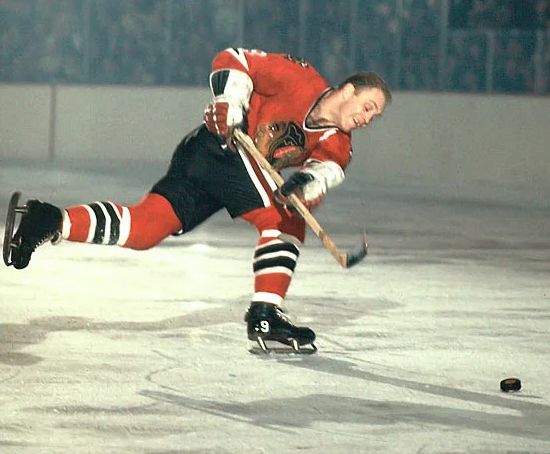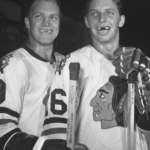Bobby Hull, also known as “The Golden Jet,” is one of the most iconic and legendary players in the history of the National Hockey League (NHL). His impact on the game of hockey was immense, and his records and achievements still stand the test of time. Let’s take a closer look at the life and career of this NHL hockey legend.

Early Life and Career
Bobby Hull was born on January 3, 1939, in Pointe Anne, Ontario, Canada. He grew up in poverty and learned to play hockey on outdoor rinks in the bitter cold of Canadian winters. His natural talent and speed on the ice were evident from a young age, and he quickly rose through the ranks of Canadian hockey.
In 1957, Hull signed with the Chicago Blackhawks, beginning what would be a 15-year career in the NHL. He quickly established himself as one of the most dominant players in the league, using his incredible speed and powerful shot to score goals at an unprecedented rate. In his second season with the Blackhawks, he led the league in scoring with 39 goals and 23 assists, earning the first of three Art Ross Trophies as the NHL’s leading scorer.
Career Highlights
Over the course of his career, Bobby Hull achieved numerous milestones and set countless records. He won two Hart Trophies as the NHL’s most valuable player, three Art Ross Trophies as the league’s leading scorer, and the Lady Byng Trophy for sportsmanship in 1965.

In 1961, Bobby Hull became the first player in NHL history to score 50 goals in a single season, a feat he would repeat in 1962 and 1963.
Another of Hull’s greatest achievements came in 1961 when he led the Chicago Blackhawks to their first Stanley Cup victory in 23 years. He scored the game-winning goal in the decisive sixth game of the series, cementing his legacy as one of the greatest players in NHL history.
Later Career and Retirement
In 1972, Bobby Hull made history again when he became the first NHL player to sign a million-dollar contract, joining the Winnipeg Jets of the rival World Hockey Association (WHA). He played for the Jets for seven seasons, leading them to two WHA championships and winning two more league MVP awards. The WHA was in operation for only seven years from 1972 to 1979. One of the main reasons that it lasted as long as it did was the draw of superstar Bobby Hull.
Hull retired from professional hockey in 1980, having scored 610 goals and 560 assists in 1,063 NHL games and 303 goals and 335 assists in 411 WHA games. He was inducted into the Hockey Hall of Fame in 1983, and his number 9 jersey was retired by both the Chicago Blackhawks and the Winnipeg Jets.
Off the Ice
Bobby Hull was not without controversy off the ice. He was known for his brash personality and occasional clashes with coaches and management. In the 1970s, he faced criticism for his comments about the Soviet Union and for playing in the WHA, which many considered to be a lesser league than the NHL.
However, Bobby Hull’s contributions to the game of hockey cannot be denied. He was one of the most dominant and influential players of his era, and his legacy lives on through his records and achievements. Bobby Hull died on January 30, 2023 but his impact on the game of hockey will continue to inspire new generations of players and fans alike.
Bobby Hull – Fast skater with a bullet of a slapshot. What player would you compare him with in today’s game? Leave comments below.




